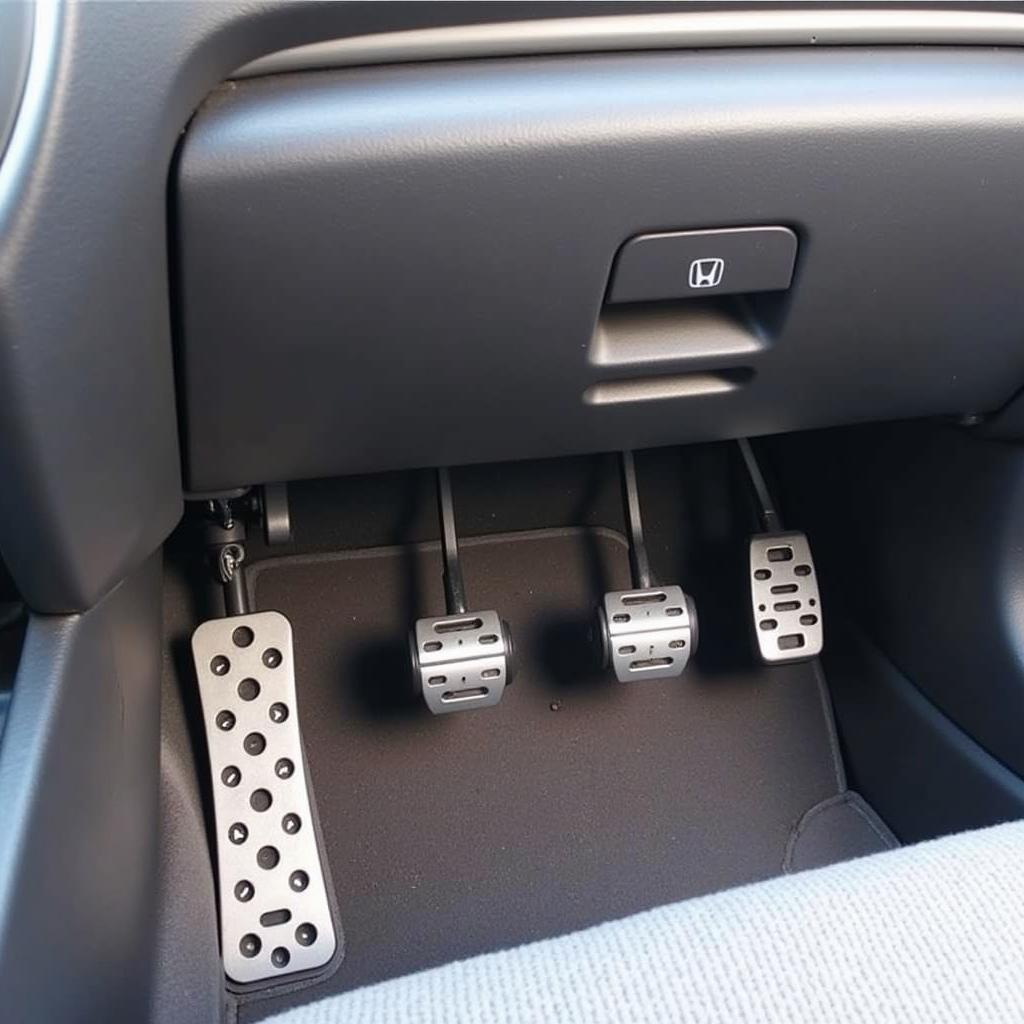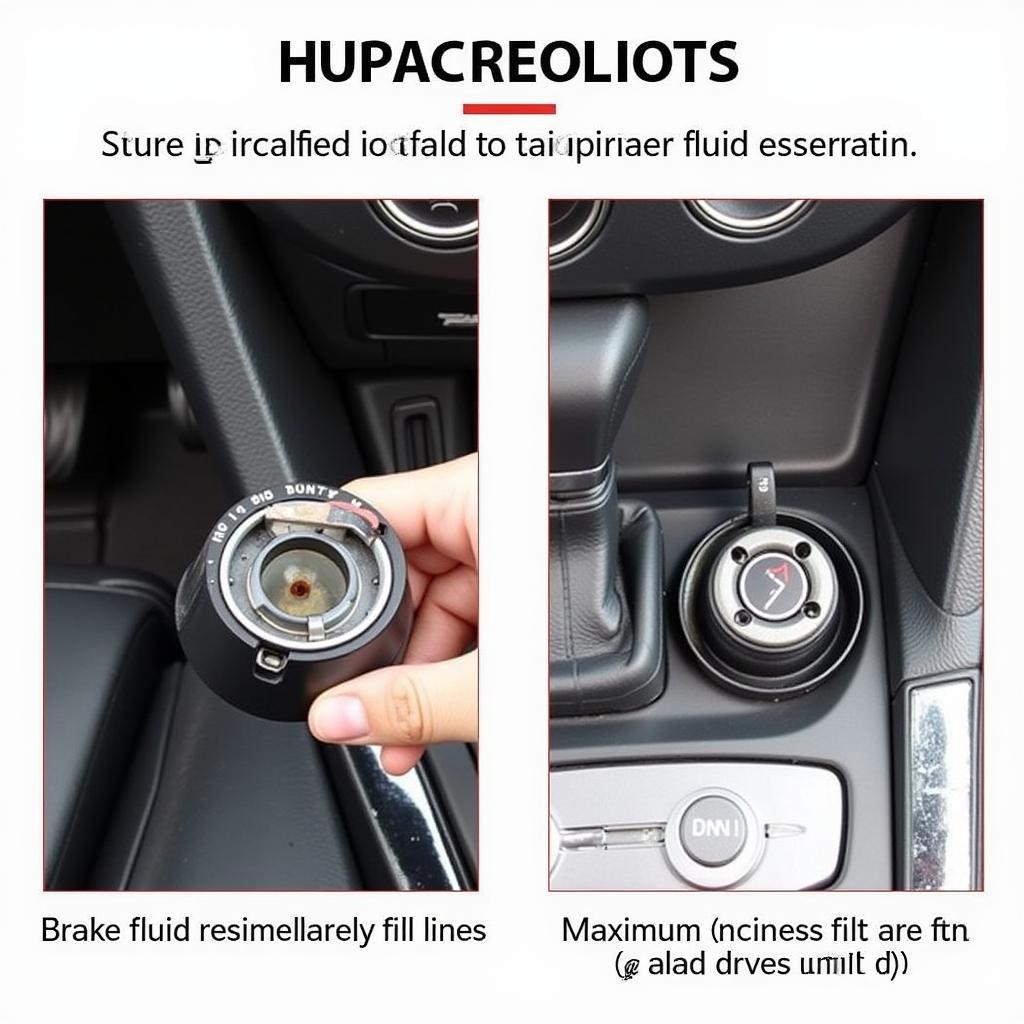The brake warning light on your Honda Accord is a crucial safety indicator. Ignoring it can lead to serious consequences. This comprehensive guide explores the common causes of a brake warning light in a Honda Accord, providing you with the knowledge and resources to address the issue effectively. We’ll cover everything from simple checks to more complex diagnostic procedures. Read on to understand what your Honda Accord is trying to tell you and get back on the road safely. See honda accord brake lamp warning light for a general overview of this issue.
Understanding Your Honda Accord’s Brake Warning Light
The brake warning light, typically a red exclamation mark within a circle, illuminates for several reasons, not all of which indicate a critical failure. It could signal low brake fluid, a malfunctioning parking brake, or even a faulty sensor. Identifying the specific cause requires a systematic approach.
Low Brake Fluid: A Common Culprit
Perhaps the most frequent cause of the brake warning light is low brake fluid. Brake fluid plays a vital role in transmitting force from the brake pedal to the brake calipers, ultimately stopping your car. Over time, brake pads wear down, and the fluid level naturally drops. However, a sudden drop could indicate a leak, requiring immediate attention.
Check your brake fluid reservoir, located under the hood. If the level is low, top it off with the correct type of brake fluid specified in your owner’s manual. If the light persists, you might have a leak.
Parking Brake Engaged: A Simple Oversight
Sometimes, the simplest explanation is the correct one. If your parking brake is engaged, even slightly, the brake warning light might illuminate. Ensure the parking brake is fully released. This often resolves the issue instantly.
Faulty Brake Light Switch: A Hidden Issue
A malfunctioning brake light switch can also trigger the warning light. This switch activates the brake lights when you press the brake pedal. If it fails, your brake lights might not work, and the warning light could come on.
Testing the brake light switch involves checking if the brake lights illuminate when the brake pedal is pressed. If not, the switch might need replacing.
 Locating the brake light switch in a Honda Accord
Locating the brake light switch in a Honda Accord
ABS Issues: More Complex Diagnostics
For models equipped with Anti-lock Braking Systems (ABS), the brake warning light could indicate an ABS malfunction. This could stem from a faulty ABS sensor, a problem with the ABS module, or other related issues. Diagnosing ABS problems usually requires specialized diagnostic tools.
You can learn more about brake light issues in older models at 2000 honda accord dashboard brake lamp warning light.
Troubleshooting Your Honda Accord’s Brake Warning Light: A Step-by-Step Guide
- Check the parking brake: Ensure the parking brake is fully disengaged.
- Inspect brake fluid level: If low, top it off. If it drops quickly again, suspect a leak.
- Check brake lights: Have someone press the brake pedal while you observe the brake lights. If they don’t illuminate, the brake light switch might be faulty.
- Consult your owner’s manual: Your Honda Accord’s owner’s manual provides model-specific information and troubleshooting tips.
- Seek professional help: If the issue persists, consult a qualified mechanic specializing in Honda Accords, especially for ABS issues. You may also find helpful information on specific models like the 2005 honda accord brake warning light.
“Regular brake maintenance is crucial for safety. Ignoring warning signs can lead to costly repairs and potentially dangerous driving situations.” – John Davis, Automotive Engineer.
When to Seek Professional Help
While some brake warning light issues can be addressed with simple checks, more complex problems, like ABS malfunctions, require professional expertise. Don’t hesitate to seek professional help if the problem persists after initial troubleshooting. More complex issues, such as the ones described in 2016 honda accord abs brake traction steering warning lights issue, definitely require expert attention.
“Modern brake systems are sophisticated, and accurate diagnosis often requires specialized equipment and knowledge. Don’t gamble with your safety.” – Maria Sanchez, Certified Mechanic.
Conclusion
The brake warning light on your Honda Accord is a vital safety feature. Addressing the underlying issue promptly ensures safe and reliable braking performance. By following the troubleshooting steps outlined in this guide and seeking professional help when needed, you can keep your Honda Accord running smoothly and safely. Don’t ignore the brake warning light; address it promptly for peace of mind and optimal driving safety. See the resource on the 2010 honda accord brake warning light for more specific information.
FAQ
- What does the brake warning light in a Honda Accord mean? It indicates a potential issue with the braking system, such as low brake fluid, a faulty parking brake, or a malfunctioning ABS.
- Is it safe to drive with the brake warning light on? It depends on the cause. If the parking brake is engaged, it’s a simple fix. However, if it’s due to low brake fluid or an ABS issue, it’s not safe and requires immediate attention.
- How do I check my Honda Accord’s brake fluid? Locate the brake fluid reservoir under the hood and check the fluid level against the minimum and maximum markings.
- What should I do if my brake warning light stays on after adding brake fluid? This likely indicates a leak or another more complex issue, requiring professional diagnosis.
- Can I fix ABS problems myself? ABS diagnostics and repairs are complex and typically require specialized tools and expertise. It’s best to consult a qualified mechanic.
- How often should I have my brakes checked? It’s recommended to have your brakes inspected at least once a year or as recommended in your Honda Accord’s maintenance schedule.
- What type of brake fluid should I use in my Honda Accord? Always consult your owner’s manual for the correct type of brake fluid specified for your specific model year.


